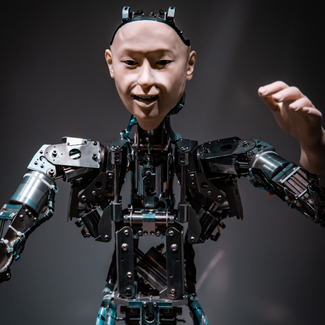
As Technology Advances, Agencies Need to Invest in Humanity
The faster technology advances, the more human skills will command a premium says the chief strategy officer at Dentsu Creative
20 September 2023
It’s easy to feel mildly terrified by technology today. Every day brings new tales of the phenomenal advance of Generative AI, such as copywriting for SEO or fun experiments with virtual persona.
Yet many of us struggle to imagine AI replacing our roles. Does a self-protective bias mean we over-estimate the likelihood of AI replacing other people’s jobs and under-estimate the likelihood of AI replacing our own? An unsinkable conviction, perhaps, that we are too unique, too idiosyncratic, too human to be replaced.
As far back as 2015, the Chief Economist of the Bank of England noted that while automation was likely to impact more manual tasks initially, “the space remaining for uniquely human skills could shrink further”. More recently, our Dentsu Creative CMO Survey revealed that 57 per cent of CMOs believe Artificial Intelligence may take their jobs, a figure rising to 60 per cent in the UK.
So, it’s fascinating to see that despite these very real concerns, in parallel CMOs are investing in a suite of technologies that enable experiences that are not only frictionless, or efficient, but disarmingly human:
Technologies from image recognition to augmented reality, voice, VR and gesture that take us far beyond the world of alphanumeric passwords and screen-based interactions.
Technologies that bring the worlds of commerce and customer service full circle; from the old-fashioned intimacy of knowing your face or trusting your handshake to facial, fingerprint and even gait recognition embedded in our payment, banking and security systems.
Technologies so natural and intuitive, my children have been heard ordering the bath to stop running. (If it’s good enough for Google, I guess it should be good enough for Thames Water….)
We’ve long known that emotion is one of the most powerful tools we have to build brands, to justify a premium and to change behaviour. As more and more of the interactions we have with our customers shift online, we have all the tools we need to craft experiences that go beyond “How does it work?” and towards “How does it feel?”
What we need to make these technologies sing are those uniquely human skills of empathy, craft and imagination. (While artificial empathy is a branch of AI, a computational approach to empathy falls short of what we as humans understand as empathetic; recognising or even responding to an emotion is not the same as feeling it in your bones.)
True empathy demands the deepest human understanding of the user: not just what they’re doing or where they’re going but how they’re feeling-excited, scared, confused- and how their emotion changes behaviour and outcomes.
We need to understand the very different roles technology plays for different audiences around the world and how technology and humanity come together to solve for deeply emotional needs. Many younger consumers, for example, say they feel more themselves as their avatar than in the real world, experimenting with gender and identity in safe spaces.
In parallel, we need the craft skills to define how a brand comes to life in the tiniest of interactions; how every tap, swipe, filter or even privacy notice can build or detract from a brand promise. So, it’s reassuring that 81 per cent of CMOs agree that customers will pay a premium for human created content, and 84 per cent that AI will never replace the human imagination.
The irony perhaps is that the faster technology advances, the more “uniquely human” skills will command a premium. The challenge for agencies may be, amidst all the vital investments we make in data and technology, how do we invest in humanity? How do we give our people the time and space they need to be fully rounded and empathetic humans, to people watch, to dive deep into niches and subcultures, to genuinely understand other humans’ lived experience?
Perhaps it’s time to flip the question we’ve been grappling with for the last few years: asking not what can be automated but what can’t be automated? Then investing as much in humanity to inspire as we in do in technology to scale. Every agency claims its most valuable asset is its people; in an increasingly automated world that may be truer than we know.
For more insights from Dentsu Creative’s CMO Survey, a study of 700 marketers around the world, download a copy here.
Patricia McDonald is the chief strategy officer at Dentsu Creative







